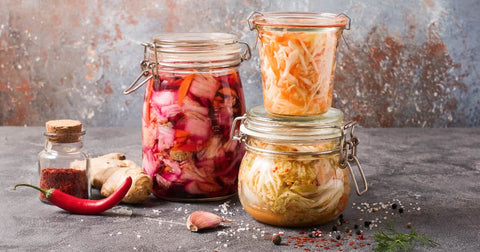In the realm of gut health, fermented foods have taken center stage, and for good reason. These tangy, probiotic-rich powerhouses offer a myriad of benefits for your digestive system and overall well-being. Among them, fermented cabbage, commonly known as sauerkraut, stands out as a nutritional superstar.
If you're a woman seeking to optimize your gut health and explore the world of fermented foods, this guide will delve into the remarkable benefits of fermented cabbage and provide insights into how to incorporate it into your diet.

What is Fermented Cabbage?
Fermented cabbage, or sauerkraut, is made through a process called lacto-fermentation. This involves submerging shredded cabbage in a salt brine, allowing naturally occurring lactic acid bacteria to convert sugars into lactic acid. This process not only preserves the cabbage but also creates a tangy flavor and, most importantly, produces beneficial probiotics.
Fermented Sauerkraut: A Probiotic Powerhouse
Probiotics are live microorganisms that, when consumed in adequate amounts, confer health benefits to the host. Fermented sauerkraut is teeming with these beneficial bacteria, primarily strains of Lactobacillus, which can:
-
Improve Digestion: Probiotics aid in breaking down food, enhancing nutrient absorption, and reducing digestive discomfort.
-
Boost Immunity: A healthy gut microbiome is crucial for a strong immune system, and sauerkraut's probiotics contribute to this balance.

-
Reduce Inflammation: Some probiotic strains have anti-inflammatory properties, potentially benefiting conditions like irritable bowel syndrome (IBS).
7 Benefits of Fermented Cabbage
1. Enhanced Gut Health:
The probiotics in fermented cabbage promote a diverse and balanced gut microbiome, crucial for optimal digestion and overall health.
2. Improved Digestion:
The fermentation process breaks down the cabbage, making it easier to digest and potentially reducing bloating and gas.
3. Boosted Immunity:
A healthy gut is linked to a strong immune system. Fermented cabbage's probiotics can help enhance your body's defense against illness.
4. Reduced Inflammation:
Chronic inflammation is a contributing factor to many diseases. Fermented cabbage's anti-inflammatory properties may help protect against chronic conditions.
5. Nutrient Absorption:
A healthy gut microbiome improves nutrient absorption, ensuring you get the most out of your food.
6. Potential Weight Management Aid:

Fermented foods like sauerkraut can promote satiety and help regulate appetite, potentially aiding in weight management.
7. Mental Health Support:
Emerging research suggests a link between gut health and mental well-being. A healthy gut microbiome might positively influence mood and reduce anxiety.
How to Ferment Cabbage: A DIY Approach
Making sauerkraut at home is a rewarding process. Here's a simplified guide:
1. Shred cabbage: Finely shred a head of cabbage.
2. Massage with salt: Massage the cabbage with salt to release its juices.
3. Pack into a jar: Pack the cabbage tightly into a clean jar, leaving some space at the top.
4. Submerge in brine: Create a brine (salt and water solution) and pour it over the cabbage, ensuring it's fully submerged.
5. Ferment: Seal the jar and let it ferment at room temperature for several weeks.
Raw Sauerkraut vs. Cooked Sauerkraut: Preserving Probiotics
While both raw and cooked sauerkraut offer nutritional benefits, raw sauerkraut retains more of the live probiotics. If you're aiming for the gut-boosting effects, enjoy sauerkraut raw. However, cooking it can add variety to your meals.
How to Cook Sauerkraut: Adding Flavor to Your Dishes
Sauerkraut can be added to various dishes, including:

-
Salads: Add a tangy crunch to your salads.
-
Sandwiches: A classic topping for Reuben sandwiches or hot dogs.
-
Side Dish: Serve it alongside roasted meats or vegetables.
-
Soups and Stews: Add a depth of flavor and nutritional boost to your soups.
How to Can Sauerkraut: Preserving for Long-Term Storage
Canning sauerkraut allows you to enjoy its benefits year-round. However, the canning process typically involves heat, which can reduce the probiotic content.
Food Intolerance and Sauerkraut: A Consideration

While sauerkraut is generally well-tolerated, some individuals with food sensitivities might experience digestive discomfort after consuming it.
If you suspect a food intolerance, consider a food sensitivity test kit to identify potential trigger foods and make informed dietary choices.
Key Takeaways:
-
Fermented cabbage, or sauerkraut, is a probiotic powerhouse that offers numerous health benefits.
-
It can improve digestion, boost immunity, reduce inflammation, and support overall gut health.
-
Choose raw sauerkraut for maximum probiotic benefits.
-
If you experience digestive issues after consuming sauerkraut, consider a food sensitivity test to identify potential triggers.
Disclaimer: This article is for informational purposes only and should not be considered a substitute for professional medical advice. If you have any concerns about your health or digestive system, consult a qualified healthcare professional.
Frequently Asked Questions:
1. Is all sauerkraut fermented?
No, not all sauerkraut is fermented. Some commercially produced sauerkraut is pasteurized, which kills the beneficial bacteria. Look for raw, unpasteurized sauerkraut in the refrigerated section of your grocery store to ensure it contains live probiotics.
2. Can I eat too much sauerkraut?
While sauerkraut is generally safe and healthy, excessive consumption might lead to digestive issues like gas and bloating, especially if you're not used to eating fermented foods. Start with small portions and gradually increase your intake as your body adjusts.
3. Does cooking sauerkraut destroy its probiotics?
Yes, high heat can kill the beneficial bacteria in sauerkraut. To maximize the probiotic benefits, enjoy it raw. However, if you prefer the taste of cooked sauerkraut, try adding it to your dishes towards the end of cooking to preserve some of the probiotics.
4. What are some creative ways to incorporate sauerkraut into my diet?
Beyond enjoying it as a condiment, you can add sauerkraut to salads, sandwiches, wraps, or even use it as a topping for baked potatoes or grilled meats. Get creative and explore different ways to enjoy this versatile fermented food!
5. I'm experiencing digestive issues after eating sauerkraut. Could it be a food intolerance?
While sauerkraut is generally well-tolerated, some individuals with food sensitivities might experience digestive discomfort after consuming it. Consider a food sensitivity test to identify potential trigger foods and make informed dietary choices.


.png?v=1737390083)
.png?v=1737187409)


